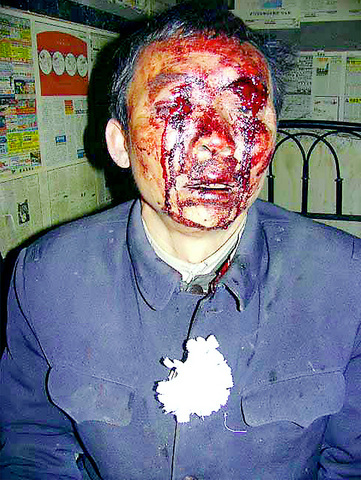China has detained dozens of people, some of whom have been severely beaten, for trying to mark the death of former leader Zhao Ziyang (
The allegations came as the government intensified security to prevent mourners attending tomorrow's funeral in Beijing for Zhao, the former Communist Party secretary-general purged for opposing the 1989 military crackdown on the Tiananmen democracy movement.

PHOTO: AFP
At least three people, including a woman in her 70s, were punched and manhandled by police officers outside the government offices which receive complaints in the Chinese capital, witnesses said.
They were among some 60 people who pinned white paper flowers to their clothes -- a traditional Chinese symbol of mourning -- said a bystander, who took pictures of the beatings and posted them on overseas Web sites.
"A man from Henan Province was beaten badly. His left eyeball looked like it was beaten out of its socket and he had a one inch cut to his right eye," said the man who requested anonymity.
"An elderly woman from Shandong Province was beaten to a point where she couldn't move and a man from Hunan Province was also beaten," he said.
Police shouted at the petitioners that Zhao, who spent nearly 16 years under house arrest until his death last week, was a "political criminal," the witness said.
"They said: `Why are you commemorating him? You're clearly opposing the government.' But the petitioners said `We think differently. We think he's a good person,'" the witness said.
Also last week, an estimated 80 to 90 petitioners were rounded up near Zhao's traditional courtyard home in Beijing for trying to get inside to pay respects and express condolences to his family, petitioners said.
"In our petitioners' hostel, all 10 people who went were detained and held from from 9am to 11pm," said Bai Shuhua, one of the 10.
"In the police station they said, `You don't seek leaders who are alive, but insist on seeking dead leaders. How can the dead help you?'" Bai said.
One of the petitioners, Liu Hongbo, was punched twice as he yelled "Zhao didn't do anything wrong," Bai said.
Zhao, premier and head of the Communist Party for much of the 1980s, died on Jan. 17 at the age of 85.
The authorities fear his death and funeral tomorrow will be a rallying point for dissidents, petitioners and people dissatisfied with the government.
Sources said invitations have been issued for the ceremony, following days of wrangling between party officials and relatives over the content of a eulogy to Zhao.
The government confirmed earlier that it would allow a "body farewell ceremony" for Zhao. It was not immediately clear how this would differ from a funeral.
But a government statement departed from the usual Chinese phrase for a funeral, apparently to reflect the lower status it accords to the event compared with the larger scale funerals normally arranged for former Communist Party leaders.

NATIONAL SECURITY THREAT: An official said that Guan Guan’s comments had gone beyond the threshold of free speech, as she advocated for the destruction of the ROC China-born media influencer Guan Guan’s (關關) residency permit has been revoked for repeatedly posting pro-China content that threatens national security, the National Immigration Agency said yesterday. Guan Guan has said many controversial things in her videos posted to Douyin (抖音), including “the red flag will soon be painted all over Taiwan” and “Taiwan is an inseparable part of China,” while expressing hope for expedited “reunification.” The agency received multiple reports alleging that Guan Guan had advocated for armed reunification last year. After investigating, the agency last month issued a notice requiring her to appear and account for her actions. Guan Guan appeared as required,

A strong cold air mass is expected to arrive tonight, bringing a change in weather and a drop in temperature, the Central Weather Administration (CWA) said. The coldest time would be early on Thursday morning, with temperatures in some areas dipping as low as 8°C, it said. Daytime highs yesterday were 22°C to 24°C in northern and eastern Taiwan, and about 25°C to 28°C in the central and southern regions, it said. However, nighttime lows would dip to about 15°C to 16°C in central and northern Taiwan as well as the northeast, and 17°C to 19°C elsewhere, it said. Tropical Storm Nokaen, currently

PAPERS, PLEASE: The gang exploited the high value of the passports, selling them at inflated prices to Chinese buyers, who would treat them as ‘invisibility cloaks’ The Yilan District Court has handed four members of a syndicate prison terms ranging from one year and two months to two years and two months for their involvement in a scheme to purchase Taiwanese passports and resell them abroad at a massive markup. A Chinese human smuggling syndicate purchased Taiwanese passports through local criminal networks, exploiting the passports’ visa-free travel privileges to turn a profit of more than 20 times the original price, the court said. Such criminal organizations enable people to impersonate Taiwanese when entering and exiting Taiwan and other countries, undermining social order and the credibility of the nation’s

‘NATO-PLUS’: ‘Our strategic partners in the Indo-Pacific are facing increasing aggression by the Chinese Communist Party,’ US Representative Rob Wittman said The US House of Representatives on Monday released its version of the Consolidated Appropriations Act, which includes US$1.15 billion to support security cooperation with Taiwan. The omnibus act, covering US$1.2 trillion of spending, allocates US$1 billion for the Taiwan Security Cooperation Initiative, as well as US$150 million for the replacement of defense articles and reimbursement of defense services provided to Taiwan. The fund allocations were based on the US National Defense Authorization Act for fiscal 2026 that was passed by the US Congress last month and authorized up to US$1 billion to the US Defense Security Cooperation Agency in support of the